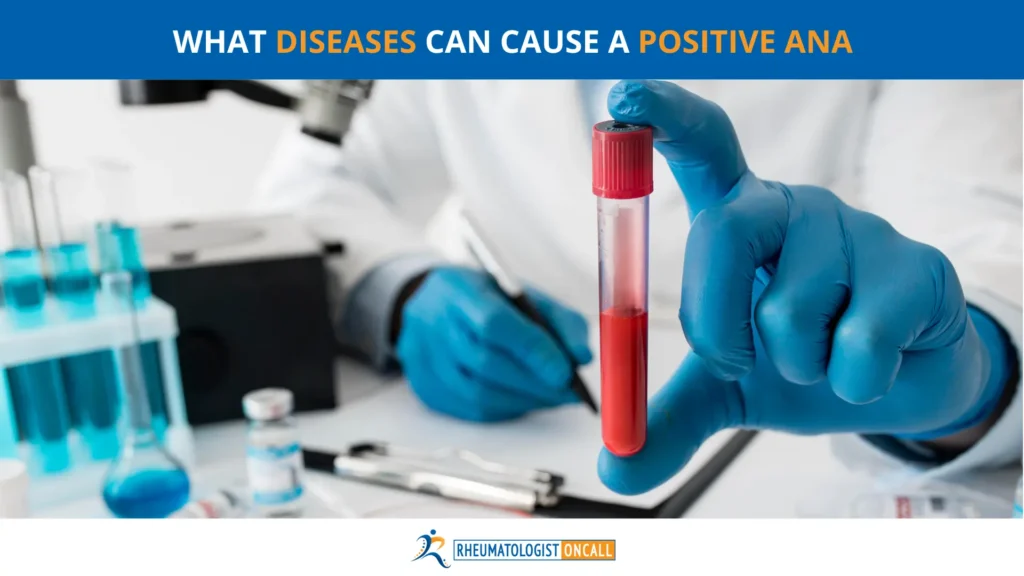SHARE
Have you recently received a positive ANA test result? You’re not alone. Antinuclear antibody (ANA) tests are commonly used in diagnosing autoimmune conditions, but their results can be complex and often confusing. This article will explore the most common causes of a positive ANA result, what it means for your health, and the steps you should take next.
Understanding ANA Tests
Antinuclear antibodies (ANA) are autoantibodies that target the nucleus, or core, of a cell. An ANA test detects these antibodies in your blood. While primarily associated with autoimmune diseases, a positive ANA can be linked to various conditions and factors (e.g., smoking, pollution, radiation, and medications).
It’s crucial to understand that a positive ANA test suggests the presence of these antibodies in your blood, but it doesn’t necessarily confirm a specific disease.
Let’s delve into the most common causes of a positive ANA result.
Common Causes of a Positive ANA Test
1. Autoimmune Diseases: The Predominant Cause
Autoimmune diseases are the leading cause of a positive ANA. These conditions occur when the immune system mistakenly begins to target the body’s cells, tissues, and organs in a bid to defend the body.
Connective Tissue Diseases
Connective tissue diseases primarily affect the body’s connective tissues – fibrous materials that bind together and support various bodily structures.
These include:
- Lupus: A chronic autoimmune disease that can damage any part of the body. Symptoms vary widely but include fatigue, joint pain, rash, enlarged lymph nodes, and fever. Almost all patients with lupus have a positive ANA test. However, it’s crucial to remember that a positive ANA is not diagnostic for lupus. The condition is diagnosed based on various signs, symptoms, and other test results.
- Sjogren’s Syndrome: It primarily presents with dry eyes and dry mouth symptoms but can target many organs like the lungs, brain, nervous system, and others. Some patients with Sjogren’s Syndrome test negative for the ANA test, but they test positive for SSA and SSB antibodies. If Sjogren’s is suspected, these antibodies should be ordered. Watch our detailed video on Sjögren’s Syndrome.
- Scleroderma: This condition causes hardening and tightening of the skin and connective tissues.
- Inflammatory Myositis: This includes conditions like polymyositis and dermatomyositis. Symptoms include muscle weakness, difficulty swallowing, skin rashes, and fatigue. A positive ANA test can be present along with other types of antibodies.
- Vasculitis: A group of disorders that involve inflammation of blood vessels.
- Rheumatoid Arthritis: While not always associated with positive ANA, some patients with rheumatoid arthritis may show positive results.
Autoimmune Thyroid Diseases
Autoimmune thyroid diseases like Hashimoto’s thyroiditis and Graves’ disease result in thyroid inflammation. These conditions can lead to an overactive or underactive thyroid, causing weight gain, fatigue, nervousness, palpitations, and more.
Autoimmune Liver Diseases
- Autoimmune Hepatitis: This disease targets the liver, causing inflammation and damage that can lead to serious complications if left unchecked.
- Primary Biliary Cirrhosis: This condition affects the bile ducts in the liver. A positive ANA test and changes in the liver enzymes should trigger an evaluation for autoimmune liver diseases.
2. Infections: The ANA Connection
Chronic infections can produce a positive ANA test result. When your body is continuously fighting off a long-term infection, your immune system remains active and may produce autoantibodies, including ANA. Examples include:
- Tuberculosis
- Histoplasmosis
- Mononucleosis
- Hepatitis B or C
- HIV
- Parvovirus B19
- Syphilis
3. Medications and Positive ANA
Certain medications, although meant to help, may be seen as foreign substances by our immune system, leading to a positive ANA result. Drugs that can trigger the production of ANA include:
- Blood pressure medications (e.g., hydralazine, hydrochlorothiazide)
- Cardiac medications (e.g., methyldopa, procainamide)
- Antibiotics (e.g., minocycline, isoniazid)
- Antifungals
- TNF-alpha inhibitors (e.g., adalimumab/ Humira, etanercept/ Enbrel)
- Immunotherapy drugs used in cancer treatment
Some medications can cause a condition called drug-induced lupus, which is associated with positive ANA tests. This condition usually resolves when the medication is discontinued. Learn more about drug-induced lupus in our detailed video
4. Cancers and Malignancies
Cancers, specifically lymphomas or other solid organ cancers, can occasionally trigger the production of ANA. This phenomenon may be due to the cancer cells altering the normal functioning of the immune system, causing it to produce antibodies.
Cancers in solid organs such as the lungs, breasts, or colon can sometimes stimulate the production of ANA. As these cancers grow, they can interfere with the normal functioning of the immune system, leading to an abnormal autoimmune response.
Radiation therapy, a treatment option for various cancers, can also lead to a positive ANA. The therapy uses high-energy particles or waves to destroy or damage cancer cells, which can also trigger an immune response. The body, in its attempt to heal and repair the damage caused by the radiation, may produce autoantibodies, including ANA. This production can vary from person to person and does not necessarily mean that an autoimmune disease is present.
5. Positive ANA in Healthy Individuals
A positive ANA test can occur even in healthy individuals. As we age and our immune system battles various factors, including infections, medications, radiation, and pollution, the production of ANA can be triggered. The prevalence of positive ANA in the general population increases with age and is more common in women than in men.
Next Steps: Get Expert Care from Rheumatologist OnCall
Understanding your ANA test results and navigating potential autoimmune conditions can be overwhelming.
Why choose Rheumatologist OnCall?
- No more waiting: Avoid the months-long wait to see a specialist. We are here for you when you need us.
- Expert Care: Our team comprises experienced rheumatologists committed to providing top-notch care.
- Comfort and Convenience: No need to travel hundreds of miles. Receive expert medical care in the comfort of your home.
- Cost-effective: We aim to provide affordable and transparent pricing, making specialist healthcare accessible to everyone.
- Patient Education: We believe in educating our patients about their conditions, enabling them to make informed decisions about their health.
Don’t let uncertainty about your ANA test results keep you from getting the necessary care. Take the first step towards understanding your health today.
Schedule your telemedicine or in-person appointment now at 650-525-4404 or [email protected].
Let Rheumatologist OnCall be your partner in navigating your health journey, helping you navigate the sometimes overwhelming world of medical diagnoses and treatments.
Frequently Asked Questions About Positive ANA Tests
Q1: Does a positive ANA test mean I have an autoimmune disease?
No, a positive ANA test alone doesn’t confirm an autoimmune disease. It’s one piece of the diagnostic puzzle that doctors use alongside other symptoms and tests.
Q2: Can ANA levels change over time?
Yes, ANA levels can fluctuate. Factors like disease activity, medication effects, and overall health can influence your ANA levels.
Q3: How common are false positive ANA tests?
False positive ANA tests can occur. The likelihood increases with age, and they’re more common in women than men.
Q4: What should I do if I have a positive ANA test?
If you have a positive ANA test, it’s important to consult with a rheumatologist for proper interpretation and further evaluation.
Q5: Can lifestyle changes affect ANA levels?
While lifestyle changes may not directly alter ANA levels, they can help manage symptoms of autoimmune diseases. A healthy diet, regular exercise, and stress management are beneficial.
Q6: Is there a specific ANA pattern associated with lupus?
While various ANA patterns can be seen in lupus, the homogeneous (diffuse) pattern is often associated with this condition. However, the pattern alone is not diagnostic.
Q7: How often should ANA tests be repeated?
The frequency of ANA testing depends on your specific condition and symptoms. Your rheumatologist will determine the appropriate testing schedule for your situation.














